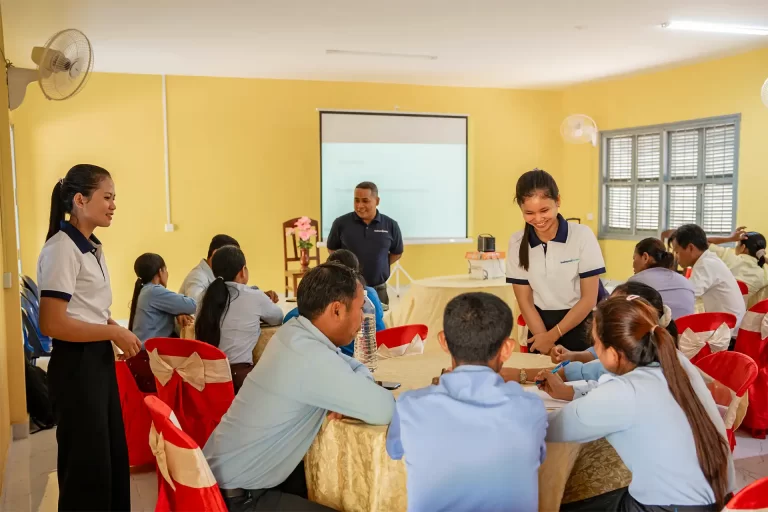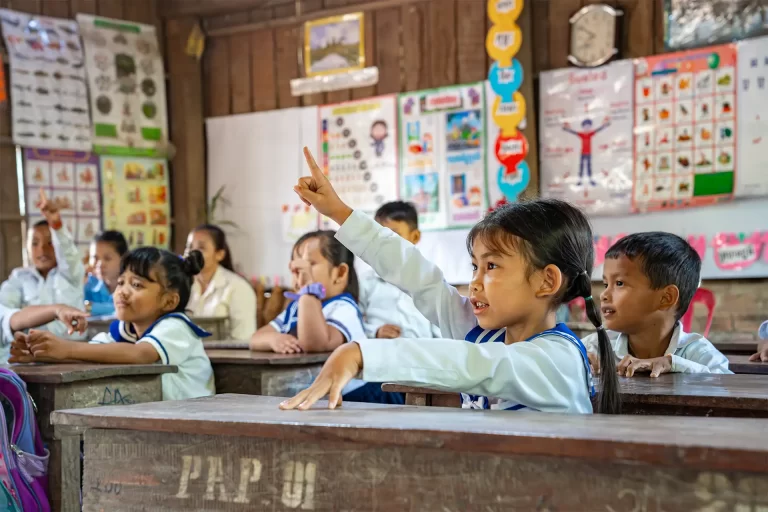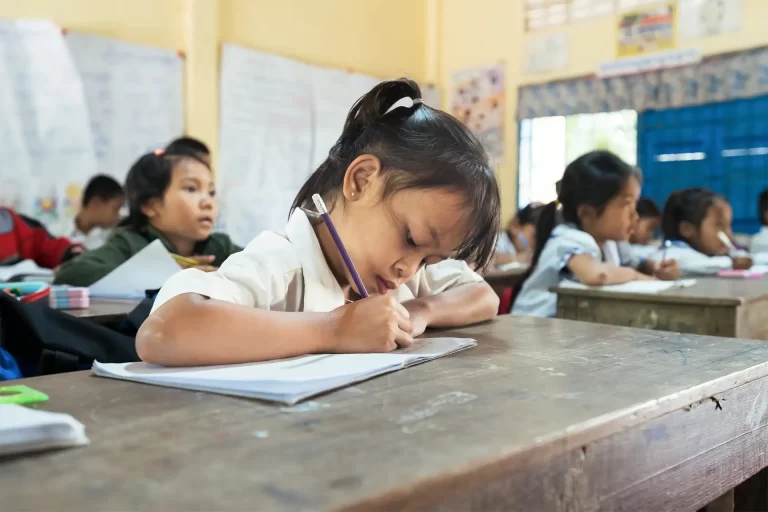SeeBeyondBorders is committed to Raising the Bar regarding community expectations for children’s educational achievement in rural Cambodia.
Teachers and school leaders are excited to participate in the Transform Education Program. Evidence shows that enhancing the skills of teachers is the single most effective way to improve learning outcomes for students. As teachers and school leaders learn and grow together in collaborative local Communities of Practice, they build the skills and expertise to significantly accelerate life-changing educational achievement for their students.
This innovative Program is being implemented in north-western Cambodia, where access to quality education is poorest and students’ educational outcomes are lowest. This means there is enormous opportunity to achieve transformational change for the most disadvantaged children and communities in Cambodia.

Watch this video to learn more about our Transform Education Program and how together with Cambodian teachers and school leaders we are creating a brighter future for Cambodian children in the most disadvantaged areas of Cambodia.
PROJECT GOAL: To establish, resource and operationalise dedicated centres to support effective Continuing Professional Development among communities of teachers, mentors and school leaders.
SeeBeyondBorders facilitates the establishment of Teacher Development Centres, re-purposing and resourcing existing school rooms These facilities are managed and maintained locally to safeguard their sustainability. They host capacity building workshops and trainings; reflective learning sessions; advocacy events, community gatherings and research collaborations among regional, national, and international educators. This means they hold immense power to drive transformative improvements in quality teaching and learning in schools.

The Teacher Development Centre Project will enable the centres to be established, managed, and utilised as collegial spaces in which to nurture aspirational and inspirational Communities of Practice among educators, with programs of professional activities that meet the needs of their stakeholders. The recruitment and engagement of appropriate personnel to take responsibility for the maintenance and management of the centres is essential, along with the establishment of operational guidelines. This Project will support the initial establishment of the physical and human resources, as well as development of essential processes and procedures.
In the longer term it is expected that district authorities will increasingly take responsibility for these centres.
PROJECT GOAL: To equip school leaders to build community and school cultures which promote improved teaching and learning outcomes.
Quality schools begin with quality leadership. Without great principals there are no great schools, but only 6% of school principals in Cambodia have received appropriate training. This lack of investment in school leadership is an enormous barrier to improving education. School principals in rural Cambodia are yearning for quality professional development to equip them to drive educational improvements for the students in their schools. They are keen to acquire the skills and expertise to become leaders in learning, not just administrative leaders.

Through the Leadership in Learning Project school leaders have opportunities to observe and interact with national and international education sector leaders, and to participate in experiences designed to expand their understanding of successful leadership. They can then integrate context-appropriate learnings into their own spheres of activity. When school leaders can confidently instil a growth mindset into their school environments, educators become open to new approaches, and communities engage with the outcomes of teaching and learning in their schools. School leaders, teachers and community members will actively work together to achieve common goals as quality teaching and learning becomes the priority in school development plans.
PROJECT GOAL: To empower teachers to identify and pursue their goals, creating their own professional development pathways to build their confidence, self-esteem and standing.
Research in Cambodia has shown that Teacher Professional Identity is a core enabler of teaching capability and effectiveness. Teachers’ perceptions of what it means to learn, how they define the tasks of teaching, how they see themselves and rate their capabilities, all influence how they teach and how they improve. Due to a perfect storm of challenges, many teachers in Cambodia have a narrow understanding of their role, seeing teaching as a technical process of repetition and discipline. Yet improving teaching capability requires more than just improving teachers’ knowledge, skills and resources. It requires emotional buy-in, personal motivation and supportive school structures.

This Teacher Professional Identity Project is grounded in the evidence that Cambodian teachers are aspirational for themselves and for their students, so the potential for an identity shift is hugely significant. When teachers have the confidence to go beyond the traditional view of teaching and learning, they can develop a dynamic, inquiry-based perception of ‘what makes a good teacher’. Mindsets expand and thinking skills develop to provide the rich soil in which to establish and grow the important technical elements.
PROJECT GOAL: To establish the practice of effective teacher mentoring, creating a collaborative community of educators who champion and share best practice to improve student learning outcomes.
Only 2.7% of 15-year-olds in Cambodia reach baseline levels of performance in maths (PISA D 2019), pointing to a significant and urgent challenge to improve outcomes and enable students to establish these basic life skills. Our UNESCO Award-winning mentoring project saw Grade 1-3 students’ achievements in maths improve by an average of 40% points.

The Maths Teacher Mentoring Project is designed to build on that success, enabling teachers to adapt alternative methods for teaching maths and use them in their classrooms. Ongoing mentoring equips teachers to better respond to their students’ needs, and as they build their skills, they have more enthusiasm and enjoyment for teaching maths. As students’ learning outcomes improve, the percentage of students who achieve higher levels of competence in maths will increase. Over time, this will potentially lead to increased retention rates, especially in rural and remote communities.
PROJECT GOAL: To equip teachers with multiple literacy-teaching strategies, resources and on-going support for better student learning outcomes.
Today in Cambodia 2.1% of 15-year-olds reach minimum literacy standards (PISA D 2019). The teaching of reading in Cambodian schools typically focuses on memorising vast numbers of letter combinations and words, in isolation, and largely without attention to meaning. By contrast, by integrating comprehension into the teaching of reading, writing, listening and speaking the SBB approach supports more effective memorisation and acquisition of literacy skills.

The Literacy Teacher Mentoring Project focuses on improving teachers’ professional knowledge and skills in literacy teaching. It introduces various universally proven approaches and methodologies which have been adapted and tested in the context of teaching Khmer literacy and enable teachers to try out and practice them. As teachers become confident with different methodologies, selecting and applying those that work best for them and their students, literacy competency among students improves.